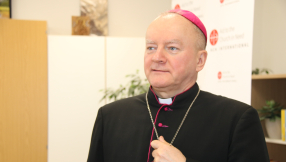
Younger generations are less likely to see a conflict between faith and science, or a belief in both evolution and God, according to a major new study.
Gen Z-ers aged 16 to 24 are also more likely than any other age group to appreciate religion's contribution to discussions around ethics, the Theos study found.
Analysing YouGov data, Theos found that Gen Z are more likely than other age groups to think religion has a place in the modern world - 57% of Gen Z-ers compared to 47% of Millennials and Gen X.
Over a third of Gen Z (37%) think science and religion are compatible - compared to 30% of the British public and 26% of Gen Xers.
Nearly two thirds (64%) think it is possible to believe in both God and evolution - at least 10% more than any other age group.
Over two thirds (68%) said it was possible to be religious and a good scientist - also 10% higher than other age groups.
A majority (62%) disagreed that religion has nothing helpful to say about ethics – far higher than Millennials (53%), Gen X (45%) and Boomers (53%).
Over three quarters (79%) said there was strong and reliable evidence for the theory of evolution, while nearly half (44%) disagreed that science will be able to explain everything one day.
Commenting on the results, Theos said they suggested that younger generations have a "more balanced perspective" when it comes to the relationship between science and religion.
Nick Spencer, Senior Fellow at Theos says "Our research revealed that the debate between science and religion has been distorted by being viewed through a few narrow lenses – such as evolution vs creation(ism) or the Big Bang vs God.
"There is a far richer conversation to be had and our interviews with experts and with the general public, particularly younger people, suggests that we are moving in the right direction."
Chris Done, Professor of Astrophysics and Theoretical Physics (University of Durham) said, "I think the study shows most that there is much less of a conflict for anyone who has had to think a bit about it, whether they be a practising scientist or a practising member of a faith community. The idea of a problem comes more from those who aren't either, who have just picked up the cultural zeitgeist."













